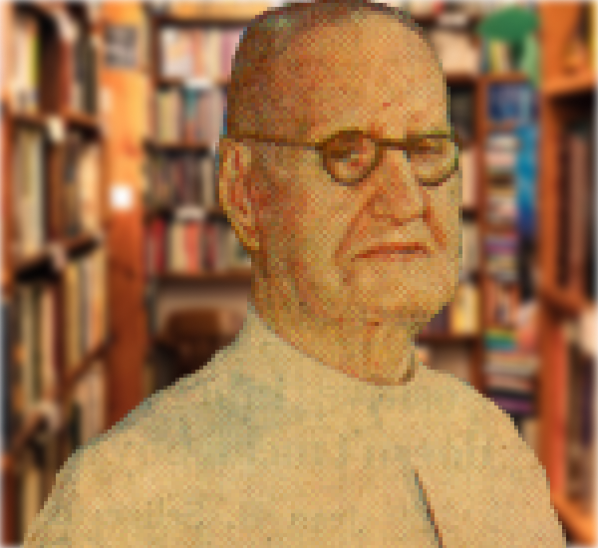JOAQUIN VILALLONGA dedicated himself to a life of service when he entered the Society of Jesus in 1885 at the age of 17. He has been closely associated with the development of our Philippine nation since he was first assigned to teach at the Ateneo Municipal de Manila 67 years ago. Later, he became Rector of that fine institution, where many of our leaders have been trained, and served in other senior posts of his Order in our Islands. His example of discipline, erudition and simplicity and his abiding faith in man’s humanity to man have been an inspiration to generations of Filipinos.
Twelve years ago, after he had held other high administrative positions of his Order in Spain, India and the Far East, he asked to come back to our country to serve the lepers at Culion. Today, at 92, he still ministers to their spiritual needs. A Chaplain extraordinary, Father VILALLONGA has shared the wisdom of his experience and the warmth of his understanding with those men, women and children who live in the banishment of a dread disease society has not yet learned to accept in its midst.
TEE TEE LUCE has given abandoned and wayward boys off the streets of Rangoon not merely a roof and food but what they missed and needed most — a home and a share of her heart.
Alarmed by the incidence of crime in her country, she spent a year studying and coming to know the deserted children who were its breeding ground. Other civic-spirited citizens joined with her in forming a Children’s Aid and Protection Society and helped plan and finance a home. On September 1, 1928, they offered a group of street boys a place to live and study and with 19 volunteers the Home for Waifs and Strays was launched.
From that time, except through the war years, Daw TEE TEE, has carried on with singleness of purpose the mission of the Home she founded. There have been runaways and other failures, but for most the Home has been a haven and an opportunity to lead a decent life. Now caring for as many as 130 boys, she has provided formal schooling, physical education and training in useful crafts and introduced these boys from the meanest walks of life to classics of music and literature. Above all, she has been their “mother.”
An active partner in her enterprise has been her husband, Professor Gordon H. Luce, himself held in affection and high regard by the people of his adopted country for his scholarship on Burma’s history and for many contributions over 47 years as teacher and unfailing friend. Though others have given generous assistance, often the two of them have had to strain their resources to keep the Home for their boys in operation. It is a fitting coincidence that she should receive this Award on the eve of its thirtieth anniversary.
Father JOAQUIN VILALLONGA and Daw TEE TEE LUCE, caring as did Ramon Magsaysay for all people as individuals and believing in their dignity and importance, have sought to improve the lot of the unfortunate and have approached the task with selfless devotion.
In electing them to share the 1959 Ramon Magsaysay Award for Public Service, the Board of Trustees recognizes their compassionate concern for others whom society had cast aside.
Humanitarians, both, they exemplify the ideal of service embodied in the doctrine of many faiths and expressed by the Founder of the Christian faith in this way: “Inasmuch as you have done it unto one of the least of these my brethren, you have done it unto me.”
I wish to express my most sincere thanks for the great honor conferred upon my humble person by the Board of Trustees of the Ramon Magsaysay Award Foundation.
Ever since the beginning of my religious life in the Society of Jesus in 1885, I have felt a strong desire to work for the people of the Philippine Archipelago, the most beautiful in the whole world. When I arrived at the Ateneo Municipal de Manila in 1892, I felt a great enthusiasm for my Filipino pupils, their customs, their language, which is sweeter than honey, pulut-pukyutan. And I am very happy to see many of our Ateneo alumni, among them Dr. Paulino Garcia, Pedro Tuason and Teodoro Evangelista — to name but a few — among the leaders of this country today.
Pinakamamahal kong mga kapatid:
Malaking kasiyahan para sa akin kung nakikita ko kayong natitipon dito, upang marinig ninyo ang aking wika. Lubos akong nagagalak sa karangalang ito. Ngunit higit ang aking kasiyahan na ang ala-ala at mga dakilang gawain ng ating yumaong Pangulong Si Ramon Magsaysay ay nananatiling sariwa sa ating isipan sa pamamagitan ng Ramon Magsaysay Award Foundation.
Vosotros estais enorgullecidos de ser Filipinos y nosotros los Jesuitas Espanoles, Americanos y Filipinos, estamos enorgullecidos de trabajar por el progreso espiritual y material del pueblo Filipino en nuestros colegios, observatorios y misiones. Y todos los Jesuitas desde el Muy Reverende Padre General hasta el ultimo Hermano Coadjutor que tuvieron la dicha de pisar estas benditas playas Filipinas estamos dispuestos a derramar nuestros sudores y nuestra sangre por la prosperidad del pueblo Filipino.
Adelante pues, mis amados Filipinos, luchad por vuestra, que trajeron a estas playas los Misioneros Espanoles, capitaneados por Legaspi y Urdaneta. Luchad por vuestros hogares. Luchad por vuestros hijos, que son sangre de vuestra sangre y hueso de vuestros huesos. Luchad, en fin, por vuestra Patria Filipinas, hasta derramar la ultima gota de vuestra sangre que corre por vuestros venos. He Dicho.

